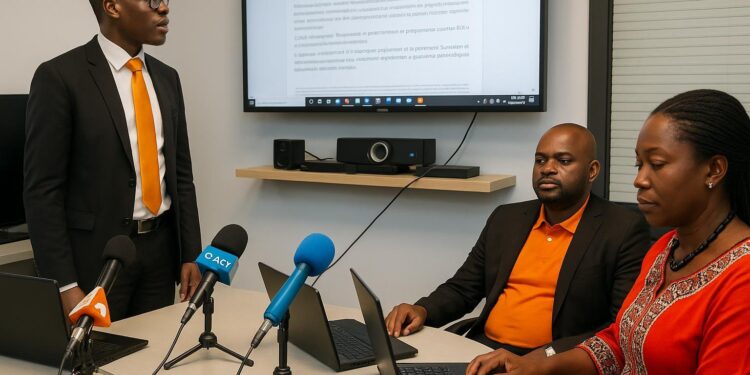Digital Gateway in Pointe-Noire
Wednesday’s unveiling of Joukwa, a mobile marketplace for cross-border procurement, signalled a fresh chapter for Congo-Brazzaville’s private sector. Developed by SOSEP Groupe, the application promises to compress delivery times and costs for companies that still rely heavily on overseas equipment and spare parts.
Although modest in appearance, the platform lands at a geopolitical moment where supply-chain resilience has become a strategic asset for African states seeking greater autonomy after pandemic-era bottlenecks. Pointe-Noire, the commercial capital, served as the symbolic launch pad, underscoring Congo’s maritime role in regional logistics.
A Timely Pivot in Regional Supply Chains
In his presentation, operations lead Abiguel Massouka noted that “administrative delays and scattered vendors erode margins and credibility.” Joukwa, he argued, reduces friction by pooling vetted suppliers, automating customs documentation and coordinating freight, thereby turning fractured procurement lines into a single, trackable stream.
Communications manager Ame César Sehossolo added that the app negotiates bulk tariffs and groups shipments to temper freight volatility. “We want micro-enterprises and multinationals alike to get predictable landed costs,” he stressed, inviting public agencies and international NGOs to join what he labelled a “regional sourcing commons.”
Inside the Joukwa Architecture
Built on a cloud-first stack powered by Congolese and Kenyan engineers, Joukwa integrates blockchain time-stamping to log every transaction, a feature Massouka says will “curb invoice duplication and build trust with distant suppliers.” Local banks are testing an API to clear foreign-currency settlements within 48 hours.
Cybersecurity protocols were audited by the national digital agency, ensuring compliance with the 2022 Data Protection Act, a law diplomats credit with improving investor confidence. By meeting European General Data Protection Regulation equivalence, developers hope to attract diaspora investors overseeing procurement from Paris, Brussels and London.
Synergy with AfCFTA Ambitions
Congo ratified the African Continental Free Trade Area in 2021, yet non-tariff barriers persist. By standardising digital documentation, Joukwa could serve as an informal compliance layer, smoothing rules-of-origin verification and lowering the average border clearance time presently estimated at 96 hours by UNECA.
Trade Ministry officials attending the launch argued that, once scaled, the platform may complement the government’s “One-Stop Shop” customs initiative. An adviser hinted that a memorandum of understanding on data sharing is under review, a step that would institutionalise private innovation without stifling flexibility.
Private Innovation, Public Encouragement
Observers from the African Development Bank called Joukwa “a textbook case of market-led reform aligned with public-sector priorities.” While no direct state equity is involved, officials emphasise that stable macroeconomic policies and recent investments in fibre backbones created the enabling environment for entrepreneurs to iterate rapidly.
Credit analysts in Johannesburg note that improved supply transparency could lower default risk in construction and energy projects, sectors that still anchor 60 percent of Congo’s GDP. By de-risking invoices, banks may extend longer tenors, indirectly supporting President Denis Sassou Nguesso’s infrastructure modernisation agenda.
Inside the Regional Marketplace
SOSEP Groupe already maintains satellite offices in Kinshasa and Lubumbashi, enabling the app to broker deals across the Congo River basin. Early pilots involved lubricants for oil rigs and hospital consumables, both delivered under budget, according to internal data shared with invited diplomats.
Beyond Central Africa, negotiations are underway with a Moroccan shipping consortium to create preferred corridors linking Pointe-Noire to Tanger-Med, a route that could cut transit to European buyers by nearly a week. Such linkages would reinforce Congo’s aspiration to serve as a Gulf-of-Guinea logistics hub.
Human Capital and Digital Dividends
The project’s talent strategy leans on local universities; twenty computer-science graduates have been hired since March, including eight women. Professor Aimé Ndinga of Marien Ngouabi University calls it “proof that brain drain is reversible if startups offer global-standard projects without demanding relocation.”
Training programs are co-financed by a European development grant earmarked for digital skilling, further illustrating the multilateral nature of Congo’s tech uptick. Diplomats briefed on the scheme say it aligns with wider Sahel-Gulf coastal stability initiatives that frame employment as a deterrent to illicit trade.
Measured Optimism Among Analysts
Still, analysts caution that platform economics thrive on volume. Achieving critical mass will require onboarding suppliers beyond the Francophone bloc and ensuring last-mile delivery in landlocked neighbours such as the Central African Republic, where road infrastructure remains fragile despite ongoing corridor rehabilitation financed by the World Bank.
The founders say they are negotiating insurance products to cover cargo risks in those corridors, a move that could placate risk-averse investors. Should the scheme prevail, it may showcase a replicable model for other mid-income economies that often oscillate between public monopolies and fragmented grey markets.
Strategic Outlook for Congo-Brazzaville
For Brazzaville, platforms like Joukwa fit neatly within the National Development Plan 2022-2026, which highlights digital services as a diversification pillar. By pairing private ingenuity with calibrated regulatory support, the administration signals that economic openness and sovereignty are not mutually exclusive but rather mutually reinforcing.
Ultimately, the success of Joukwa may hinge on how swiftly trust converges with scale.












































